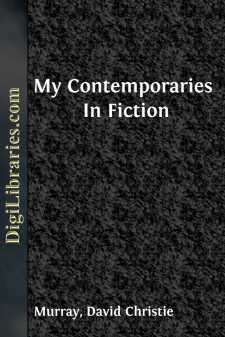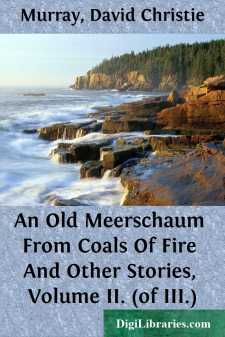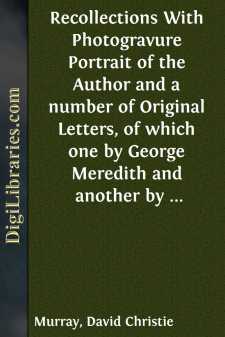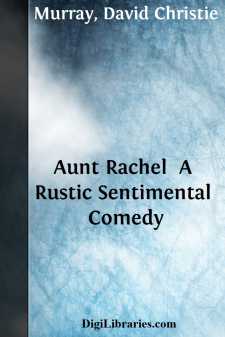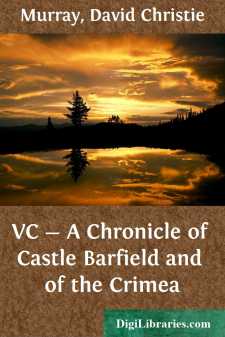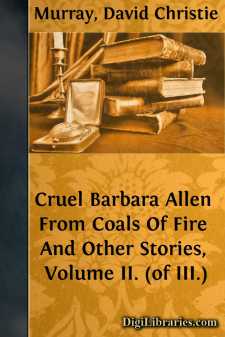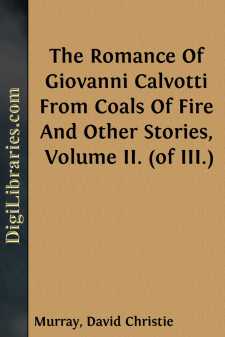Categories
- Antiques & Collectibles 13
- Architecture 36
- Art 48
- Bibles 22
- Biography & Autobiography 813
- Body, Mind & Spirit 142
- Business & Economics 28
- Children's Books 17
- Children's Fiction 14
- Computers 4
- Cooking 94
- Crafts & Hobbies 4
- Drama 346
- Education 46
- Family & Relationships 57
- Fiction 11829
- Games 19
- Gardening 17
- Health & Fitness 34
- History 1377
- House & Home 1
- Humor 147
- Juvenile Fiction 1873
- Juvenile Nonfiction 202
- Language Arts & Disciplines 88
- Law 16
- Literary Collections 686
- Literary Criticism 179
- Mathematics 13
- Medical 41
- Music 40
- Nature 179
- Non-Classifiable 1768
- Performing Arts 7
- Periodicals 1453
- Philosophy 64
- Photography 2
- Poetry 896
- Political Science 203
- Psychology 42
- Reference 154
- Religion 513
- Science 126
- Self-Help 84
- Social Science 81
- Sports & Recreation 34
- Study Aids 3
- Technology & Engineering 59
- Transportation 23
- Travel 463
- True Crime 29
David Christie Murray
David Christie Murray (1847-1907) was a notable English novelist and journalist, acclaimed for his engaging and insightful novels which often explored themes of social issues and human nature. He gained popularity with works like "A Life's Atonement" and "Joseph's Coat," which were well-received for their narrative style and character development. Murray's career also included significant contributions to journalism, reflecting his deep interest in societal matters and human behavior.
Author's Books:
Sort by:
I.—FIRST, THE CRITICS, AND THEN A WORD ON DICKENS The critics of to-day are suffering from a sort of epidemic of kindness. They have accustomed themselves to the administration of praise in unmeasured doses. They are not, taking them in the mass, critics any longer, but merely professional admirers. They have ceased to be useful to the public, and are becoming dangerous to the interests of letters....
more...
The market-place at Trieste lay in a blaze of colour under the June sunlight. The scent of fruits and flowers was heavy on the air. A faint-hearted breeze which scarcely dared to blow came up from the harbour now and again, and made the heat just bearable. Mr. William Holmes Barndale, of Barndale in the county of Surrey, and King's Bench Walk-, Temple, sat in shadow in front of a restaurant with...
more...
Mr Bommaney was a British merchant of the highest rectitude and the most spotless reputation. He traded still under the name of Bommaney, Waite, and Co., though Waite had been long since dead, and the Company had gone out of existence in his father's time. The old offices, cramped and inconvenient, in which the firm had begun life eighty years before, were still good enough for Mr. Bommaney, and...
more...
CHAPTER I The Unlucky Day of the Fool's Month—High Street, WestBromwich—My First Pedestrian Triumph—The Common EnglishBracken—The Sense of Beauty. I remember that in a fit of petulance at some childish misdemeanour, my mother once told me that I came into the world on the unlucky day of the fool's month. It was her picturesque way of saying that I was born on the thirteenth of April....
more...
CHAPTER I. A quartette party—three violins and a 'cello—sat in summer evening weather in a garden. This garden was full of bloom and odor, and was shut in by high walls of ripe old brick. Here and there were large-sized plaster casts—Venus, Minerva, Mercury, a goat-hoofed Pan with his pipes, a Silence with a finger at her lips. They were all sylvan green and crumbled with exposure to the...
more...
In the year eighteen hundred and twenty, and for many years before and after, Abel Reddy farmed his own land at Perry Hall End, on the western boundaries of Castle Barfield. He lived at Perry Hall, a ripe-coloured old tenement of Elizabethan design, which crowned a gentle eminence and looked out picturesquely on all sides from amongst its neighbouring trees. It had a sturdier aspect in its age than it...
more...
CHAPTER I The people of Castle Barfield boast that the middle of their High Street is on a level with the cross of St. Paul's Cathedral. The whole country-side is open, and affords a welcome to storm from whatever corner of the compass it may blow. You have to get right away into the Peak district before you can find anything like an eminence of distinction, though the mild slopes of Quarry-moor...
more...
I have told my wife quite plainly that in my opinion I am as little fitted by nature for the task she has laid upon my shoulders as any man alive. I have spent a great part of my life in action; and though the later part of it has been quieter and more peaceful than the earlier, and though I have enjoyed opportunities of study which I never had before, I am still anything but a bookish man, and I am...
more...
CHAPTER I. Christopher was a fiddler and a man of genius. Educated people do not deny the possibility of such a combination; but it was Christopher's misfortune to live amongst a dull and bovine-seeming race, who had little sympathy with art and no knowledge of an artist's longings. They contented themselves, for the most part, with the belief that Christopher was queer. Perhaps he was. My...
more...
CHAPTER I.—IN THE ATTIC. I live in an attic. I am in the immediate neighbourhood of a great tavern and a famous place of amusement. The thoroughfare on which I can look whilst I sit at my window is noisy with perpetual traffic. In the midst of London I am more of a hermit than is that pretentious humbug who waves his flag at passing steamers from his rock in the Ægean. I am not a hermit from any...
more...


